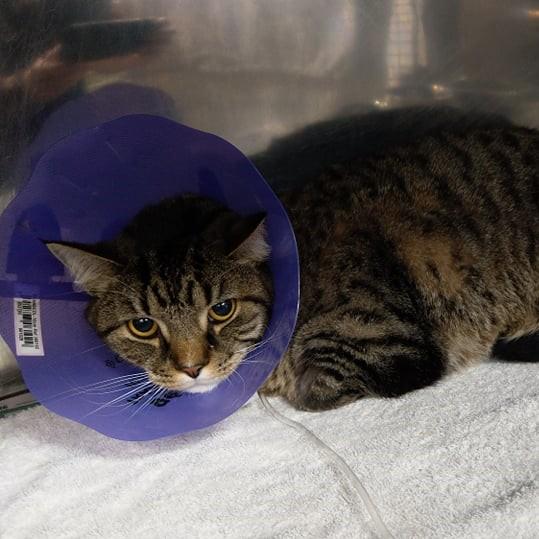Treated for a painful and life-threatening blockage

Tough boy Oscar visited our team to investigate an urgent and uncomfortable issue; a blocked urethra.
The urethra is the tube that connects the bladder to the outside world, and a blockage is considered a life-threatening (and very painful) emergency.
Blockages occur due to a syndrome termed feline lower urinary tract disease (FLUTD), and can be caused by a number of factors including crystals in the urine, infection, bladder cancer or bladder stones. In many cases, however, it's a result of a condition called idiopathic cystitis, an inflammation of the bladder for an unknown reason.
In Oscar's case, a urinary catheter needed to be placed whilst under anaesthetic in order to resolve the blockage. The procedure was a success, and after several days of close observation and treatment this strong patient was able to return home to his loving family! As part of his ongoing treatment, Oscar was assigned a long-term management plan to help prevent further blockages from occurring. This included a special scientifically formulated diet, and lifestyle strategies to increase his water intake, alleviate stress and provide him psychological enrichment.
Signs that your cat may be developing FLUTD or a blocked urethra include frequent urination, laying in their litter tray, blood in their urine, straining to urinate, poor appetite, and vomiting. There is no single underlying cause of FLUTD, but it's well recognised that stress, obesity and poor water intake are key risk factors. The chosen course of treatment will depend on the underlying cause, and whether a blockage has occurred. A blocked urethra is a time-sensitive medical emergency, and needs to be treated urgently.
If you've noticed any of the above symptoms in your pet, please contact us at (02) 6922 5375 and make an appointment for your pet to be assessed by our veterinary team as soon as possible.